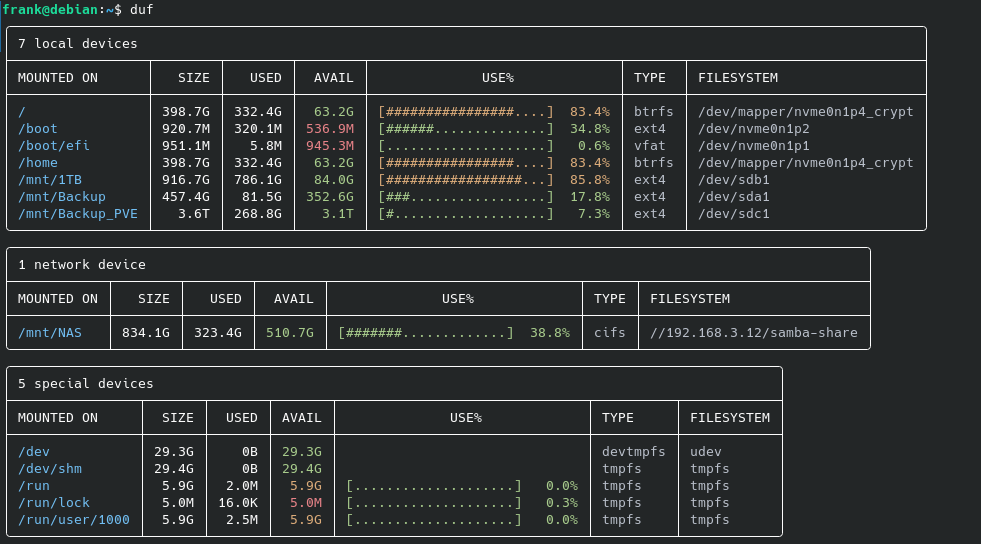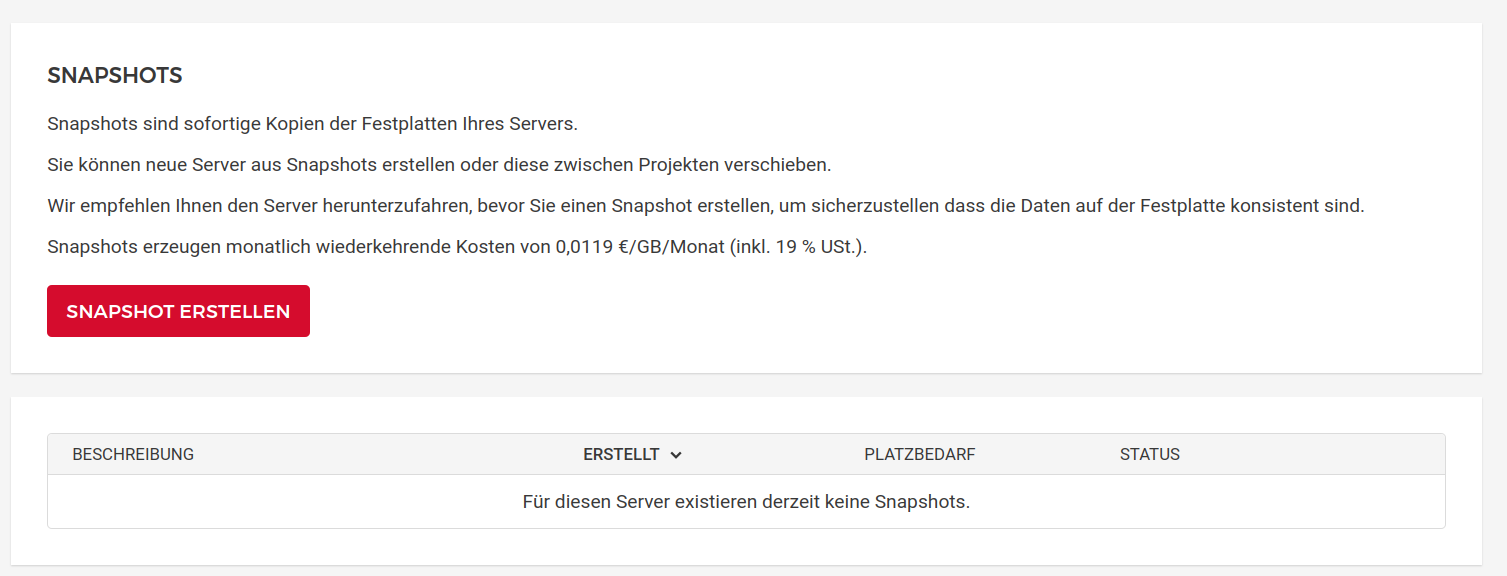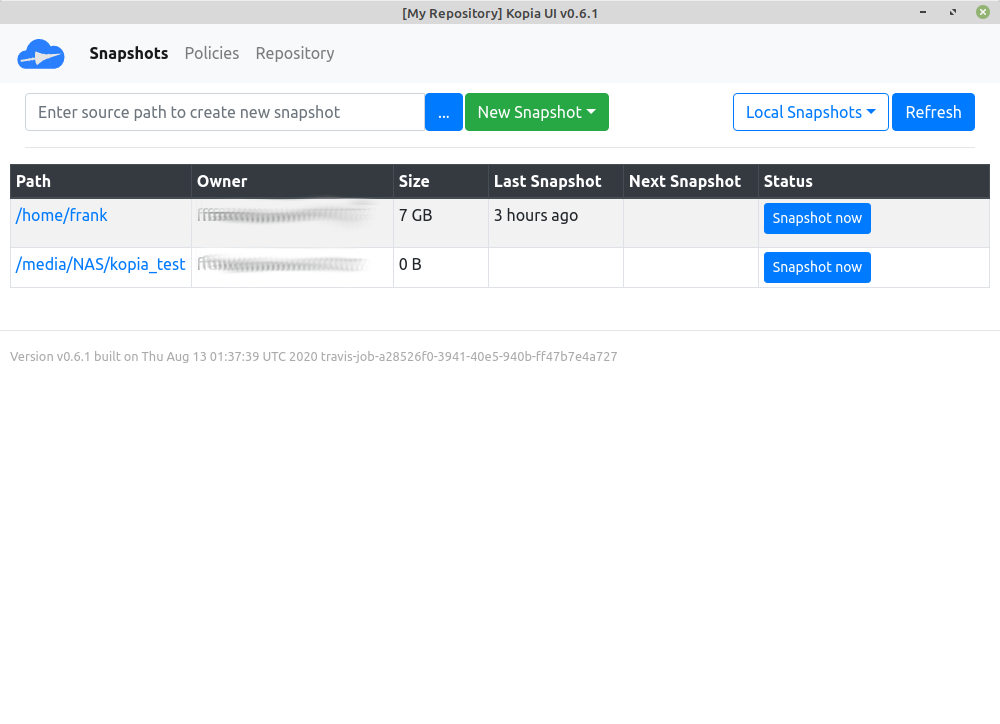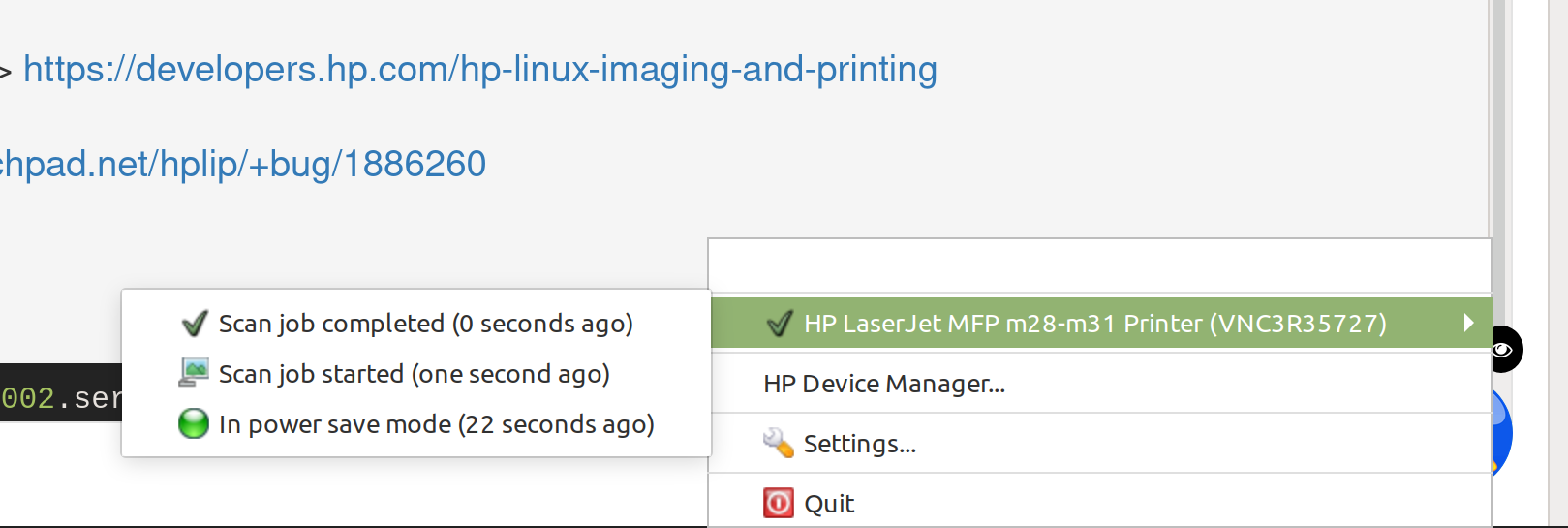mdadm
-
Info
raid_pool0 = sda1 = /dev/mapper/raid_pool0 raid_pool1 = sdb1 = /dev/mapper/raid_pool1Verschlüsseln
sudo cryptsetup --key-size 512 --hash sha256 --iter-time 5000 --use-random luksFormat /dev/sda1 sudo cryptsetup --key-size 512 --hash sha256 --iter-time 5000 --use-random luksFormat /dev/sdb1Platten entschlüsseln
sudo cryptsetup open /dev/sda1 raid_pool0 sudo cryptsetup open /dev/sdb1 raid_pool1RAID1 anlegen
sudo mdadm --create /dev/md0 --auto md --level=1 --raid-devices=2 /dev/mapper/raid_pool0 /dev/mapper/raid_pool1 sudo mkfs.ext4 /dev/md0Script zum Entschlüsseln und Mounten
#!/bin/bash ###############################################################################$ # Autor: Frank Mankel # Verschlüsseltes Raid1 einbinden! # # Hardware: # ROCKPro64v2.1 # PCIe SATA Karte # 2St. 2,5 Zoll HDD Platten a 2TB # # Software: # bionic-minimal 0.7.9 # ###############################################################################$ #Passwort abfragen echo "Passwort eingeben!" read -s password echo "Bitte warten......" #Passwörter abfragen echo -n $password | cryptsetup open /dev/sda1 raid_pool0 -d - echo -n $password | cryptsetup open /dev/sdb1 raid_pool1 -d - #Raid1 mounten mount /dev/md0 /mnt/raid echo "Laufwerke erfolgreich gemountet!" -
Wir möchten dieses vorhandene Raid1 auf einem neuen Betriebssystem wieder aktivieren!
Erstmal was installieren
sudo apt install cryptsetup sudo apt install mdadmDanach ließ sich das Device /dev/md0 nicht mounten.
frank@rockpro64:~$ sudo mount /dev/md0 /mnt/raid mount: special device /dev/md0 does not existIrgendwie logisch. Das haben wir beim letzten Mal ja auch angelegt, ist jetzt aber natürlich nicht angelegt. Ok, wie bekommen wir das jetzt wieder an den Start?
sudo mdadm --assemble --scanDanach ist das Device wieder vorhanden und das Script funktioniert wieder wie gewohnt.
-
Mein RAID1 war mal wieder nicht komplett

Da beide Platten verschlüsselt sind, werden diese erst mal entsperrt.
cryptsetup open /dev/sda1 raid_pool0 cryptsetup open /dev/sdb1 raid_pool1Danach geht es weiter...
Nach fdisk -l
Disk /dev/mapper/raid_pool0: 1,8 TiB, 2000395771392 bytes, 3907022991 sectors Units: sectors of 1 * 512 = 512 bytes Sector size (logical/physical): 512 bytes / 4096 bytes I/O size (minimum/optimal): 4096 bytes / 4096 bytes Disk /dev/md0: 1,8 TiB, 2000260497408 bytes, 3906758784 sectors Units: sectors of 1 * 512 = 512 bytes Sector size (logical/physical): 512 bytes / 4096 bytes I/O size (minimum/optimal): 4096 bytes / 4096 bytes Disk /dev/mapper/raid_pool1: 1,8 TiB, 2000395771392 bytes, 3907022991 sectors Units: sectors of 1 * 512 = 512 bytes Sector size (logical/physical): 512 bytes / 4096 bytes I/O size (minimum/optimal): 4096 bytes / 4096 bytesMir fehlt das Device /dev/md1 Warum??? Keine Ahnung!!!
Schauen wir mal nach, was noch lebt.
root@rockpro64v_2_1:~# mdadm --examine --scan ARRAY /dev/md/0 metadata=1.2 UUID=33ac7964:473fe590:3682dd85:a979b336 name=rockpro64v_2_1:0So, Device md0 lebt

Wir mounten das noch lebende Laufwerk.
mount /dev/md0 /mnt/raidDanach geschaut, ob mit NFS die Daten erreichbar sind. Alles OK.
Kurz checken
root@rockpro64v_2_1:~# cat /proc/mdstat Personalities : [linear] [multipath] [raid0] [raid1] [raid6] [raid5] [raid4] [raid10] md0 : active raid1 dm-0[2] 1953379392 blocks super 1.2 [2/1] [U_] bitmap: 7/15 pages [28KB], 65536KB chunk unused devices: <none>Da sieht man das ein Laufwerk fehlt. Dann wollen wir mal adden

root@rockpro64v_2_1:~# mdadm /dev/md0 --manage --add /dev/mapper/raid_pool1 mdadm: re-added /dev/mapper/raid_pool1Jetzt läuft das Recovery
root@rockpro64v_2_1:~# cat /proc/mdstat Personalities : [linear] [multipath] [raid0] [raid1] [raid6] [raid5] [raid4] [raid10] md0 : active raid1 dm-1[1] dm-0[2] 1953379392 blocks super 1.2 [2/1] [U_] [>....................] recovery = 1.2% (25185728/1953379392) finish=604.2min speed=53184K/sec bitmap: 7/15 pages [28KB], 65536KB chunk unused devices: <none>Und Fertig

root@rockpro64v_2_1:~# cat /proc/mdstat Personalities : [linear] [multipath] [raid0] [raid1] [raid6] [raid5] [raid4] [raid10] md0 : active raid1 dm-1[1] dm-0[2] 1953379392 blocks super 1.2 [2/2] [UU] bitmap: 0/15 pages [0KB], 65536KB chunk unused devices: <none>Daten kontrolliert, noch alles da. Puuuuuh! Aber, warum das Ganze???? Ich bin übrigens jetzt wieder auf Kamils Image und dabei ist mir aufgefallen, das das Recovery wesentlich schneller ging als bei meinem letzten Versuch. Hmm???????
Zum Schluß noch was aus dem dmesg
[ 8.612039] ata1: SATA max UDMA/133 abar m512@0xfa010000 port 0xfa010100 irq 231 [ 8.612047] ata2: SATA max UDMA/133 abar m512@0xfa010000 port 0xfa010180 irq 231 [ 9.085894] ata1: SATA link up 6.0 Gbps (SStatus 133 SControl 300) [ 9.123159] ata1.00: ATA-10: ST2000LM015-2E8174, SDM1, max UDMA/133 [ 9.123169] ata1.00: 3907029168 sectors, multi 16: LBA48 NCQ (depth 32), AA [ 9.172776] ata1.00: configured for UDMA/133 [ 9.173235] scsi 0:0:0:0: Direct-Access ATA ST2000LM015-2E81 SDM1 PQ: 0 ANSI: 5 [ 9.173782] sd 0:0:0:0: [sda] 3907029168 512-byte logical blocks: (2.00 TB/1.82 TiB) [ 9.173792] sd 0:0:0:0: [sda] 4096-byte physical blocks [ 9.173889] sd 0:0:0:0: [sda] Write Protect is off [ 9.173896] sd 0:0:0:0: [sda] Mode Sense: 00 3a 00 00 [ 9.173933] sd 0:0:0:0: [sda] Write cache: enabled, read cache: enabled, doesn't support DPO or FUA [ 9.239218] sda: sda1 [ 9.240144] sd 0:0:0:0: [sda] Attached SCSI disk [ 9.649853] ata2: SATA link up 6.0 Gbps (SStatus 133 SControl 300) [ 9.687095] ata2.00: ATA-10: ST2000LM015-2E8174, SDM1, max UDMA/133 [ 9.687104] ata2.00: 3907029168 sectors, multi 16: LBA48 NCQ (depth 32), AA [ 9.696476] NFSD: starting 45-second grace period (net f00000a1) [ 9.736698] ata2.00: configured for UDMA/133 [ 9.737137] scsi 1:0:0:0: Direct-Access ATA ST2000LM015-2E81 SDM1 PQ: 0 ANSI: 5 [ 9.739557] sd 1:0:0:0: [sdb] 3907029168 512-byte logical blocks: (2.00 TB/1.82 TiB) [ 9.739568] sd 1:0:0:0: [sdb] 4096-byte physical blocks [ 9.739592] sd 1:0:0:0: [sdb] Write Protect is off [ 9.739597] sd 1:0:0:0: [sdb] Mode Sense: 00 3a 00 00 [ 9.739631] sd 1:0:0:0: [sdb] Write cache: enabled, read cache: enabled, doesn't support DPO or FUA [ 9.803472] sdb: sdb1 [ 9.804397] sd 1:0:0:0: [sdb] Attached SCSI disk [ 22.550770] rk_gmac-dwmac fe300000.ethernet eth0: Link is Up - 100Mbps/Full - flow control off [ 22.550820] IPv6: ADDRCONF(NETDEV_CHANGE): eth0: link becomes ready [ 42.132977] device-mapper: uevent: version 1.0.3 [ 42.133199] device-mapper: ioctl: 4.39.0-ioctl (2018-04-03) initialised: dm-devel@redhat.com [ 141.047476] md/raid1:md0: active with 1 out of 2 mirrors [ 141.061140] md0: detected capacity change from 0 to 2000260497408 [ 522.183161] EXT4-fs (md0): mounted filesystem with ordered data mode. Opts: (null) [ 559.062705] nfsd: last server has exited, flushing export cache [ 559.084203] NFSD: starting 45-second grace period (net f00000a1) [ 840.473519] md: recovery of RAID array md0 [ 1141.650170] md: md0: recovery done. -
Ok, öfter was Neues

Mein Device md0 war weg, das hieß nun /dev/md127 !?!?!
Gut, etwas gelesen, dann neugestartet.
Die Datei /etc/mdadm/mdadm.conf geändert
# mdadm.conf # # !NB! Run update-initramfs -u after updating this file. # !NB! This will ensure that initramfs has an uptodate copy. # # Please refer to mdadm.conf(5) for information about this file. # # by default (built-in), scan all partitions (/proc/partitions) and all # containers for MD superblocks. alternatively, specify devices to scan, using # wildcards if desired. #DEVICE partitions containers # automatically tag new arrays as belonging to the local system HOMEHOST <system> # instruct the monitoring daemon where to send mail alerts MAILADDR root # definitions of existing MD arrays # This configuration was auto-generated on Sat, 20 Oct 2018 09:01:46 +0200 by mkconf ARRAY /dev/md0 level=raid1 num-devices=2 metadata=1.20 UUID=33ac7964:473fe590:3682dd85:a979b336An die Daten, was man da eintragen muss kommt man mit
rock64@rp64v_2_1_NAS:~$ sudo mdadm --detail /dev/md0 mdadm: metadata format 1.20 unknown, ignored. /dev/md0: Version : 1.2 Creation Time : Sat Oct 20 09:05:51 2018 Raid Level : raid1 Array Size : 1953379392 (1862.89 GiB 2000.26 GB) Used Dev Size : 1953379392 (1862.89 GiB 2000.26 GB) Raid Devices : 2 Total Devices : 2 Persistence : Superblock is persistent Intent Bitmap : Internal Update Time : Thu Feb 7 20:10:12 2019 State : clean Active Devices : 2 Working Devices : 2 Failed Devices : 0 Spare Devices : 0 Consistency Policy : bitmap Name : rockpro64v_2_1:0 UUID : 33ac7964:473fe590:3682dd85:a979b336 Events : 66932 Number Major Minor RaidDevice State 2 252 1 0 active sync /dev/dm-1 1 252 0 1 active sync /dev/dm-0Nach dem Eintragen der Änderungen den Befehl hier nicht vergessen

update-initramfs -uMal schauen ob das jetzt mal was länger klappt

-
Nachdem ich die SATA-Karte gewechselt habe, sind meine Probleme verschwunden. Mein NAS läuft seit Monaten einwandfrei.
rock64@rp64v_2_1_NAS:~$ uptime 21:57:50 up 73 days, 4:44, 1 user, load average: 0,00, 0,00, 0,00https://forum.frank-mankel.org/topic/299/sata-karte-marvell-88se9230-chipsatz/16
-
-
-
-
Docker & Redis Datenbank
Verschoben Linux -
-
-
-



